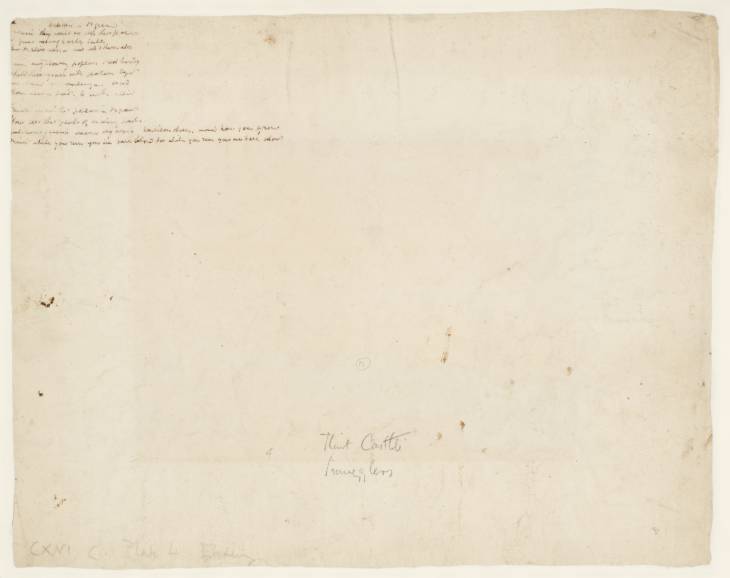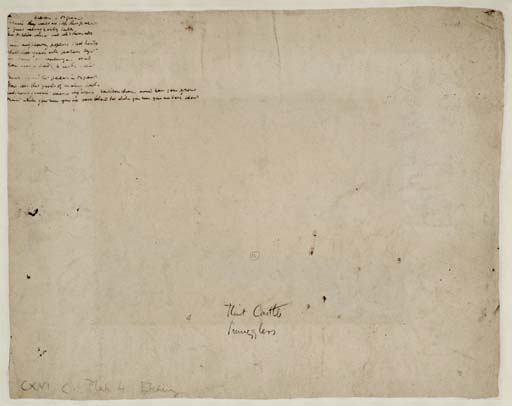Joseph Mallord William Turner Inscription by Turner: Draft of Poetry: 'Poplars in Disgrace' c.1806-7
Image 1 of 2
Joseph Mallord William Turner,
Inscription by Turner: Draft of Poetry: 'Poplars in Disgrace'
c.1806-7
Joseph Mallord William Turner 1775–1851
Inscription by Turner: Draft of Poetry: ‘Poplars in Disgrace’ circa 1806–7
D40141
Pen and ink on off-white wove writing paper, 332 x 420 mm
Inscribed by the artist in ink with lines of poetry, top left (see main catalogue text)
Inscribed in pencil ‘12’ [circled] centre, ‘4 Flint Castle | Smugglers’ bottom centre, and ‘CXVI. C. Plate 4 Etching’ lower left
Inscribed by the artist in ink with lines of poetry, top left (see main catalogue text)
Inscribed in pencil ‘12’ [circled] centre, ‘4 Flint Castle | Smugglers’ bottom centre, and ‘CXVI. C. Plate 4 Etching’ lower left
Accepted by the nation as part of the Turner Bequest 1856
References
1909
A.J. Finberg, A Complete Inventory of the Drawings of the Turner Bequest, London 1909, vol.I, p.315, under CXVI C.
1910
Alexander J. Finberg, Turner’s Sketches and Drawings, London 1910, pp.75–6.
1961
Alexander J. Finberg, The Life of J.M.W. Turner, R.A. Second Edition, Revised, with a Supplement, by Hilda F. Finberg, revised ed., Oxford 1961, p.130.
1966
Jack Lindsay, The Sunset Ship: The Poems of J.M.W. Turner, Lowestoft 1966, p.94.
1985
Jack Lindsay, Turner: The Man and His Art, London 1985, p.58.
1990
Andrew Wilton and Rosalind Mallord Turner, Painting and Poetry: Turner’s ‘Verse Book’ and his Work of 1804–1812, exhibition catalogue, Tate Gallery, London 1990, p.169.
1996
Gillian Forrester, Turner’s ‘Drawing Book’: The Liber Studiorum, exhibition catalogue, Tate Gallery, London 1996, p.50 under no.4i.
The recto of this sheet shows a Scene on the French Coast (Tate D08104; Turner Bequest CXVI C), one of Turner’s early studies for the Liber Studiorum; the sheet is not watermarked, but its batch has been identified as ‘1794 | J WHATMAN’.1 The whimsical poem on its verso is unrelated. Finberg imagined it might have been ‘discovered in a book or magazine’ while staying with W.F. Wells and his family at Knockholt – where Turner was said to have begun work on the Liber designs in 1806 (see general Liber introduction) – since ‘there lingers about it a faint echo of those scenes of “fun and merriment” which one of Turner’s young playmates recalled in after years.’2 Finberg and Lindsay later gave more psychological interpretations, respectively: ‘The verses deal with the perils of premature ambition; their moral is that pride will have a fall, or that it is a mistake to be in too great a hurry to o’ertop your neighbours’;3 ‘We can perhaps read some fears or doubts about the project ... “How near is pride to earth allied.”’4
a [...] poplars in disgrace
[...]ecause they would no stop their pace
[...]r grew [?unnecessarily/irregularly] tall
[...]heir master came and lop’d them all
[...]ecause they would no stop their pace
[...]r grew [?unnecessarily/irregularly] tall
[...]heir master came and lop’d them all
[...]ome [?neighbourly/neighbouring] poplars stood hard by
[...]eheld thir growt with jealous Eye
[...] saw ... exulting ... cried
How near is pride to earth allied
[...]eheld thir growt with jealous Eye
[...] saw ... exulting ... cried
How near is pride to earth allied
Friends said the poplars in disgrace
You see the fault of making haste
Ambitious greatness caused my woe, Ambition shun, mind how you grow
Mind while you run you are bare below for while you run you are bare below
You see the fault of making haste
Ambitious greatness caused my woe, Ambition shun, mind how you grow
Mind while you run you are bare below for while you run you are bare below
This should be compared with Rosalind Turner’s reading:
A row of poplars in disgrace | Because they would no stop their pace | or grew irregularly tall | Their Master came and lop’d them all | Some neighbourly poplars stood hardby | Beheld their growt[h] with jealous eye | Now saw – exulting – cried | How near is pride to earth allied | Friends said the poplars in disgrace | You see the fault of making hast[e] | Ambitious greatness caused my woe | Mind while you run you are bare below | ambition shun, mind how you grow | for while you run you are bare below7
The poem has been set to music by the British composer Ivan Moseley, as ‘Poplars in disgrace’, one of Three Turner Fragments for mixed choir (2001);8 the others are ‘Rainy morning, no fishing’ from the Frittlewell sketchbook (Tate D07756; Turner Bequest CXII, inside back cover)9 and ‘Eolian Harp’ from p.31 of Turner’s Verse Book (private collection).10
Matthew Imms
May 2006
Ivan Moseley, ‘Three Turner Fragments (2001)’, Sibelius Music, accessed 7 October 2005, http://www.sibeliusmusic.com/cgi-bin/show_score.pl?scoreid=17511 .
How to cite
Matthew Imms, ‘Inscription by Turner: Draft of Poetry: ‘Poplars in Disgrace’ c.1806–7 by Joseph Mallord William Turner’, catalogue entry, May 2006, in David Blayney Brown (ed.), J.M.W. Turner: Sketchbooks, Drawings and Watercolours, Tate Research Publication, December 2012, https://www


